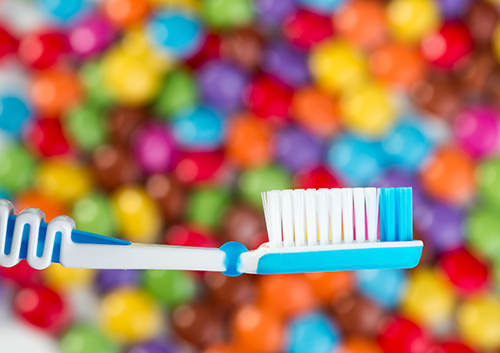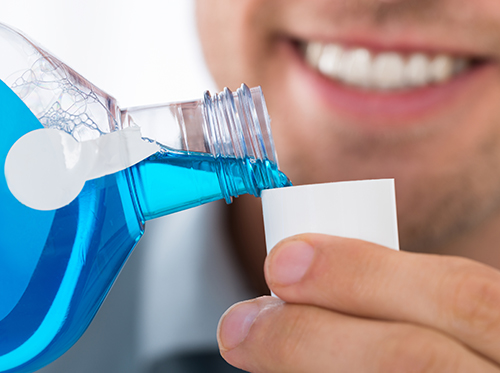September 27th, 2017

Oral hygiene has always been an important part of maintaining overall health. For thousands of years, humans have found ways to keep their teeth and mouths clean. According to the American Dental Association (ADA), “early forms of the toothbrush have existed for nearly 5,000 years.” But what exactly did the first toothbrush look like?
Toothbrush Timeline
With help from The Library of Congress, Dr. Stephen Hudis and our team have compiled a timeline with some interesting details about the evolution of the toothbrush:
- 3000 BC – Perhaps the earliest form of the toothbrush, the “chew stick” was used by Ancient civilizations. People would rub this thin twig with a frayed end against their teeth to remove food and plaque.
- 1498 – The bristle toothbrush was invented in China and had many similarities to the toothbrushes used today. These devices were made by attaching the stiff, coarse hairs from the back of a hog’s neck to handles that were typically made from bone or bamboo.
- 1938 – Signaling the end of the boar bristle, Dupont de Nemours introduced nylon bristles, and Americans welcomed Doctor West’s Miracle Toothbrush, the first nylon toothbrush.
- 1960 – The Squibb Company introduced Broxodent, one of the first electric toothbrushes, to the American market.
Toothbrushes Today
Today, there are many brands of toothbrushes that often advertise different benefits. The variety of options may seem overwhelming, but the most important thing is for you to find a toothbrush that you like and find easy to use.
The ADA recommends that you choose a toothbrush that fits comfortably and allows you to effectively reach all areas of your mouth. Whether you decide to use a manual or a powered toothbrush, make sure that you thoroughly clean all surfaces of your teeth twice a day.
Society has come a long way since the days of the chew stick, but one thing that remains the same is the importance of consistent and effective personal oral hygiene.
September 20th, 2017

In a world where everything moves so quickly and teens and young adults find themselves pulling “all-nighters” or working long hours, energy drinks have grabbed the spotlight. You’ll have one (or three) and suddenly you have the drive you need to keep going.
The same can be said for sports drinks. It’s common for people to have one even when they’re not engaged in any strenuous physical activity, which is what they were designed for. People will drink them simply because they’ve grown to love the taste.
Although they might taste great and boost your energy, there’s a serious down side to consuming energy and sports drinks on a steady basis. Studies have shown that these drinks contain so much acid that they start to destroy your teeth after just five days of consistent use.
The acid in these drinks destroys your tooth enamel, which makes your teeth more vulnerable to bacteria. This can progress to staining, tooth decay, and hypersensitivity.
That’s why Dr. Stephen Hudis and our team want to encourage you to try to limit the amount of sports and energy drinks you consume. If you do enjoy either or both of these drinks, you should make it a habit to rinse your mouth with water immediately after consumption, and brush your teeth about an hour later, after the period when acid has a softening effect on your enamel has passed.
If you feel like you’re already experiencing the side effects of heavy energy and sports drink consumption, visit our Princeton, NJ office, and our team can provide solutions for how to prevent further damage from occurring. It’s never too late to change a bad habit!
March 8th, 2017

A solid oral health routine begins with daily brushing, flossing, and rinsing. Without a consistent oral health regimen, you may begin to experience tooth decay and bacterial infections. Few patients ask Dr. Stephen Hudis about different mouthwash options, so we’ve put together a list of the conditions that mouthwashes can treat. This should help you decide which oral rinse would be best for you.
Gum Health
Antiseptic mouthwashes reduce large amounts of bacteria on and near the gum line and generally help to decrease your chances of developing gingivitis. The key ingredients of antiseptic mouthwashes are antibacterial and antimicrobial items. Antiseptic mouthwash is a preferable option if you are concerned about the general gum health of your mouth.
Fluoride
Fluoride is a great tool for preventive tooth decay treatment. It prevents tooth decay and is great for oral health in general because it kills germs that can live in your mouth. Fluoride also builds stronger teeth. If you’re a bottled water drinker, Dr. Stephen Hudis may recommend that you purchase a simple fluoride rinse to use after brushing.
Bad Breath
Fluoride mouthwash can be used to fight any bad breath issues you may be facing. It’s designed to combat any bacteria that might be building up in your mouth. Most mouthwashes will help eliminate bad breath, but some are specifically designed to address this difficult problem. If you feel as though this might be turning into a chronic problem, please contact Dr. Stephen Hudis to discuss other options that would be effective for treating your symptoms.
American Dental Association (ADA Approval)
The ADA reviews all mouth rinses for safety measures and to prove effectiveness. Any mouthwash approved by the ADA has met strict guidelines according to whether the manufacturer’s claims are supported with scientific evidence. If you’re looking for a quality mouthwash, look for one that has the ADA seal of approval to ensure you have a great rinse for your mouth.
Considerations
When you’re trying to decide which mouthwash to pick, contact our Princeton, NJ or ask Dr. Stephen Hudis during your next appointment. If you experience a burning sensation in the soft tissues of your mouth, be sure to discontinue use immediately. Avoid letting children under age six use a mouth rinse, and be sure to keep all mouthwashes out of the reach of children, because they contain alcohol and other substances that could be harmful.
March 1st, 2017

Oral-systemic health is the idea that oral health is a critical and interconnected component to a patient’s overall health and well-being. Studies show that people who have poor oral health are more likely to have other health conditions such as heart disease, diabetes, or a high likelihood of stroke.
Some of the data suggests that oral pathogens may trigger up to 50% of heart attacks, and that the oral bacteria P. gingivalis may cause a 13.6-fold increase in patients’ risk of a heart attack.
Still, the exact relationship between oral and overall health isn't fully known — whether one causes the other or how treating one might affect the other. But it should serve as a warning call to anyone suffering with poor oral health, especially periodontal disease.
More studies need to be conducted to establish the precise link between the two, but whatever it is, one thing is certain: good oral hygiene makes for good oral health. Many dentists and doctors realize the need to work together as a cohesive healthcare team to improve and maintain the health of their communities.
The American Dental Association says oral health is essential to overall health, and not just a luxury. They are setting goals to reduce the amount of tooth decay in low-income communities for both children and adults.
So what is a patient about this information regarding oral-systemic health? Here are some tips to increase and maintain your overall well-being:
- Have an effective oral hygiene routine. Brush twice a day for two minutes each time, floss daily, clean your tongue, and avoid sugary beverages.
- Visit your dentist regularly. Regular cleanings and checkups at your dentist’s office will keep your mouth clean and ensure you’re taking good care of it.
- Eat a healthful diet. A diet rich in fruits, vegetables, whole grains, and natural, unprocessed foods contributes to the overall health of your body.
- Stay hydrated. Drink plenty of pure, clean water throughout the day. A good rule of thumb is to drink eight eight-ounce glasses a day.
- Relax, destress. Stress can play a big role in all forms of disease. Take time during your day to relax, meditate, stretch, and allow your body and mind to rest.
If you have questions about your oral health and how it may be affecting your general health, feel free to ask Dr. Stephen Hudis during your next visit to our Princeton, NJ office.
15.00








